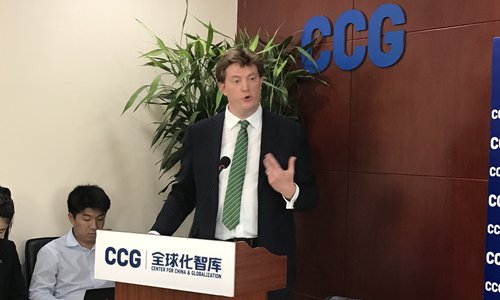HOME >> BUSINESS
AIIB to offset negative impact of trade war by stabilizing, boosting economies
Source:Global Times Published: 2019/6/11 22:03:41

Danny Alexander, vice president of the Asian Infrastructure Investment Bank gives a speech at a Beijing-based think tank, Center for China and Globalization. Photo: Song Lin/GT
As a multilateral financial institution initiated by China, the Asian Infrastructure Investment Bank (AIIB) will assume a more important role in stabilizing and boosting the economies of its 97 members to counter the negative effects brought by the China-US trade war, a senior executive said.
"It is obvious that rising geopolitical uncertainty, including the trade tension, resulted in a modest downturn in private-sector investment in infrastructure in 2018," Danny Alexander, vice president of the AIIB, told the Global Times in a meeting held at a Beijing-based think tank, Center for China and Globalization, on Tuesday.
As the escalating trade war might raise financial risks for the economy, Alexander said that the bank has a very rigorous assessment procedure that looks at the quality of the project, and it is investing in projects of high quality that will deliver strong returns.
The trade war has reinforced the importance of the role of the AIIB, which seeks long-term investments and could invest countercyclically. "We support infrastructure programs, even when there are other economic difficulties," he said.
"Inadequate infrastructure is one of the key constraints on sustainable economic growth, particularly in developing countries," Alexander said.
The AIIB has approved $8 billion worth of investments in 40 projects across 16 member economies, he said.
As a multilateral development bank with a mission to improve social and economic outcomes in Asia, it has developed 97 members around the world.
AIIB has a core value of "Lean, Clean and Green", which means that it will use investors' funds effectively and efficiently, with good governance and high standards, and launch projects that provide sustainable development and are environment-friendly.
Posted in: ECONOMY